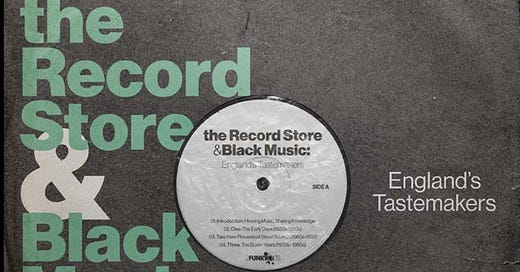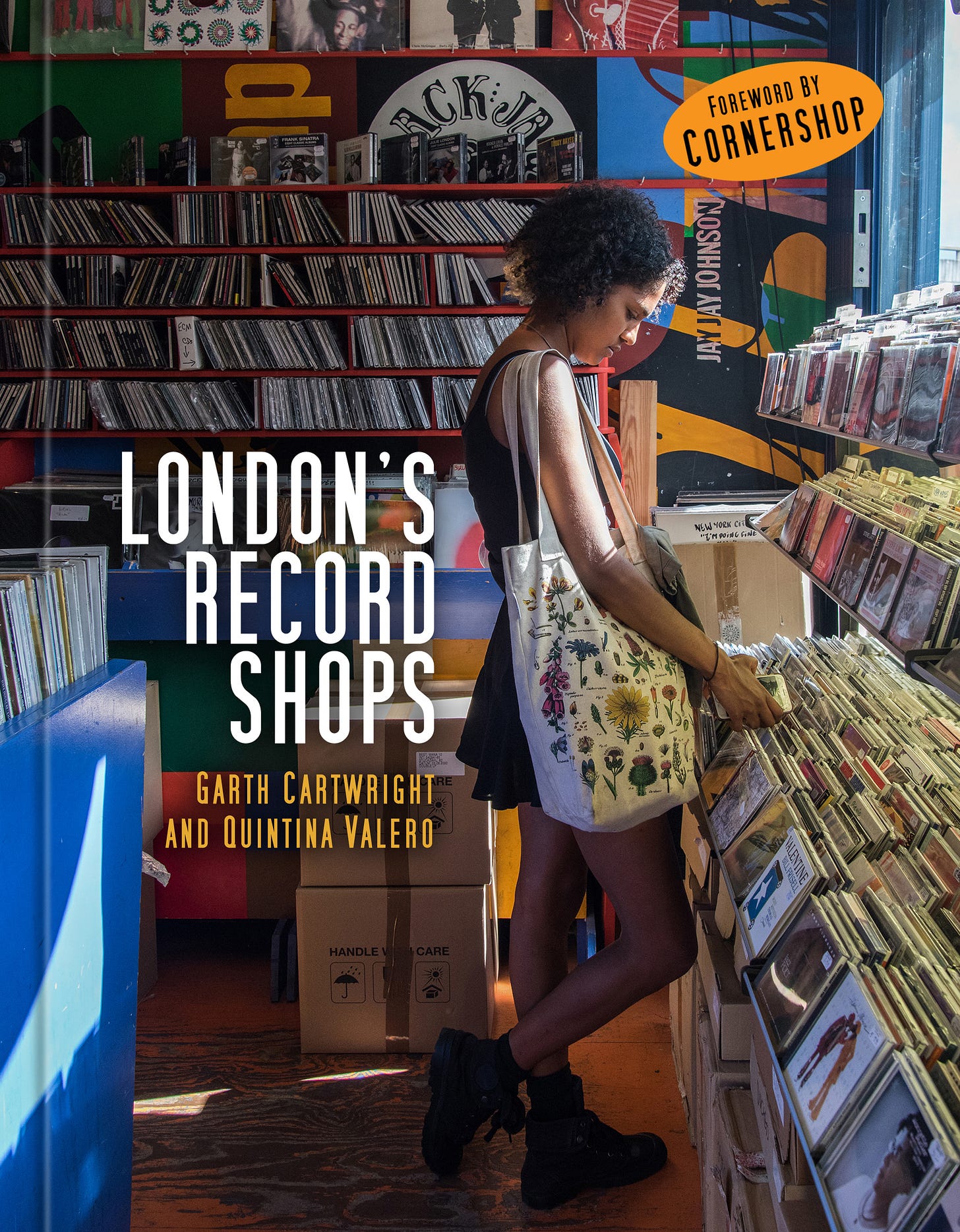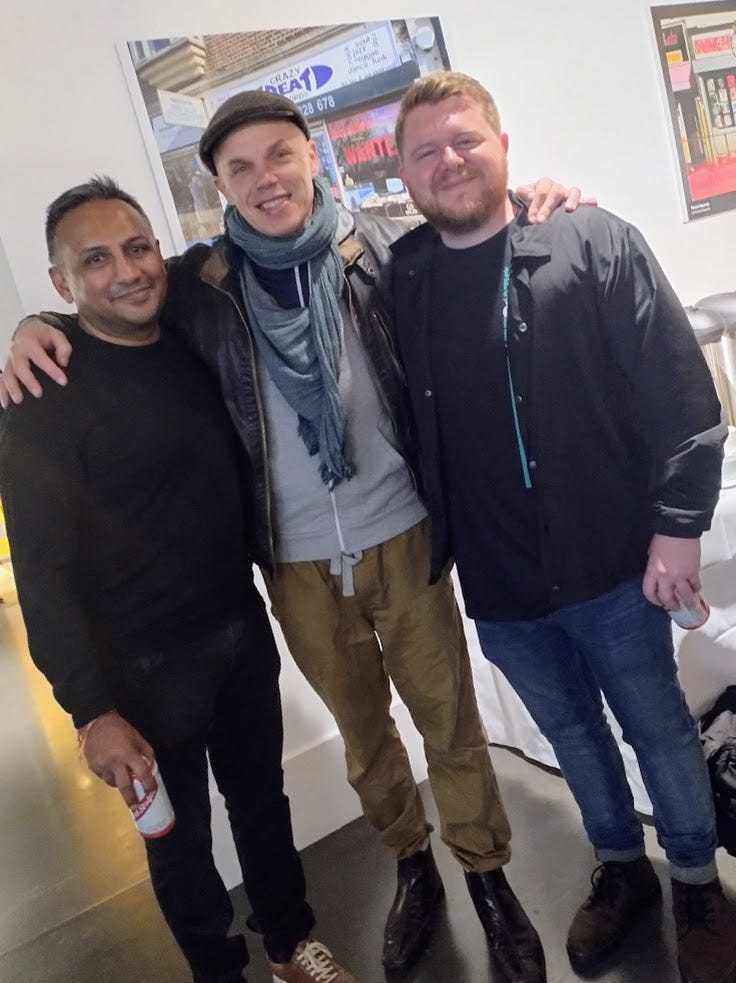I COULD WRITE A BOOK (OPPS! I DID IT AGAIN...)
THE YAK HAS A NEW BOOK OUT - JUST IN TIME FOR XMAS (NOT MY INTENTION: HONESTLY!)
Last Saturday afternoon I attended an event at Greenwich University focused on the launch of a multi-media project entitled The Record Store & Black Music: England’s Tastemakers. While the project was initiated by Leicester community organisation 2FunkyArts they had worked alongside a team at Greenwich University: thus the launch in one of London’s leafiest boroughs, instead of a gritty Midlands city. I was invited because I’d contributed text to the project (which I understood was largely focused on providing educational materials to schools/libraries/youth organisations).
Before entering Greenwich University - which now sits where the open market used to be in the 90s. I used to love shopping there for used records/books/clothes etc - I dropped by the Greenwich branch of Record & Tape Exchange (no one has ever referred to it as the 90s rebrand Music & Video Exchange) and, with only time for a quick dig, I found a few gems.
Best of these is a 1966 45 by Etta James: I’m So Glad (I Found Love In You)/I Prefer You (Cadet). I’ve always loved Etta’s voice and tend to consider her finest recordings being on Cadet/Chess in the 1960s but didn’t recognise either song. No matter, Ralph Bass - a pioneering R&B producer/talent scout - is credited alongside Monk Higgins as producer. I don’t recognise Higgins name (he also co-wrote both sides) but, for £2, it was worth a punt (nice condition, too).
Isn’t this amazing? Such a stomping rhythm - bet the northern soul fans love to spin to it.
I also picked up You Caught My Eye by Judy Boucher. I don’t know this record but am aware of Boucher as a singer of what’s called “lovers rock”: a gentle, pop-soul flavoured reggae style that largely developed in Britain with young Black women singing romantic tunes - Susan Cadogan, who I recently saw at Skabour Festival, was one of the first, while Carol Thompson and Janet Kay are its most exalted exponents. Boucher’s previous 45 Can’t Be With You Tonight hit No 3 UK in 1987 (I checked and this one got to No 18 the same year).
Boucher’s 45s were produced by Sonny Roberts and released on his Orbitone Records label - in 1959 Roberts built the first recording studio to be owned/operated by a Black person in Britain (he recorded ska and gospel here, releasing some of these recordings on his Planetone label). In 1970 he opened the Orbitone Records shop in Harlesden (and , from here, also ran the Orbitone record label, which issued lovers rock, reggae and West African records: Boucher gave him his greatest chart success across a remarkable life in music). Roberts was one of those largely unsung Windrush-era pioneers who helped shape British music making (he died aged 89 in 2021, having resettled in Jamaica).
Lovers rock with a country flavour. Nice.
I’ve described these 45s in detail as both relate to The Record Store & Black Music: England’s Tastemakers: the theme of this project is to document how important record shops selling Black music were to both the development of British popular music and as community hubs/business centres for the nascent Black British population.
My text is chronological and documents the opening of specialist soul music shops in the 1960s: here the mods and the Stones/Beatles et al bought the US records that would shape the sound of British rock (and provide the basis for clubbing). At the same time these emporiums were paralleled by the opening of shops selling West Indian music: calypso, ska, rocksteady, gospel, big people music (soul, country, sweet jazz, Elvis etc) by migrants who aimed to serve their communities (Indian, Turkish, Greek, Yugoslav, West African migrants also opened record shops - alongside barbers, beauty salons, tailors, grocers etc in post-WW2 Britain).
As Jamaican music rose in popularity across the UK more and more of these shops - or “shacks” as they, employing a Jamaican parlance, sometimes called them - opened. The owners were White, Black and Brown (Lee Gopthal, who launched the first chain of Black music record shops across London in the 1960s, was Jamaican of Indian heritage). Thus my Etta James record may have originally been purchased in a soul specialist, while Judy Boucher could have retailed in one of myriad Jamaican music vendors.
Armed with such, I joined my brother-in-arms John Williams - last noted on the Yak when we sought out Kent’s record shops in late January - and off we went to the university. John came in as editor on the project (he’s a fine writer and editor + has worked in record shops thus possesses a solid understanding of the subject). Upon entering we were greeted by Sam, the 2Funky employee who I most regularly communicated with while working on the project, given a drink and took to admiring large photos of record shops from a bygone age that were mounted on the wall.
Soul City: in the late-60s the pioneering London record shop ran its own in-house label releasing US R&B gems they licensed from small US labels.
Then I spotted David Nathan. David is one of the UK’s foremost soul music aficionados. Actually, he started his working life in Musicland in Kilburn, one of London’s first Jamaican-owned record shops, in 1965, then co-founded Soul City (in nearby Deptford), the first British shop devoted to US R&B, in 1966 - Soul City went on to run its own record label and the term “northern soul” originated here to describe a genre of upbeat dance 45s. David’s also a writer - his The Soulful Divas book features Nathan’s interviews (and often lasting friendships) with Whitney, Aretha, Dionne, Esther et al (I’m not making this up). I’d not seen David since pre-pandemic times so it was a treat to catch up.
My eye strayed to a table loaded with hardcover books titled The Record Store & Black Music: England’s Tastemakers. I picked one up and opening to the title page saw “Written by Garth Cartwright with contributions from Sean Dudley”. Well, knock me down with a feather!
As previously noted, I was commissioned to write text (15,000 words) and, on top of this, edit dozens of interviews (with those who worked or shopped in the emporiums that once sold Black music on the British high street) into bite-sized quotes for 2Funky. My understanding was that this was all to be used in an educational resource. Thus my surprise to see a coffee table-style book with an ISSN number and retailing at £25. Being a freelance writer means things can sometimes get lost in translation (so to speak) and 2Funky were open about never having handled a project such as this one before. So I guess we spoke over one another: I just heard “educational/schools” and overlooked that the text might also end up being published as a book that ends up available in book shops and from online retailers.
Rhythm Division, Roman Road, Bow, East London: the record shop at the heart of grime and, arguably, the last that represented a Black music genre as it initially flourished.
Sam gave me a copy of The Record Store & Black Music: England’s Tastemakers and as John and I flicked through it we exchanged glances of the “looks good, eh?” type. It does, indeed, look good. My other thought - and one that dogged me throughout the writing process - was “why did I sell myself so cheap?” The answer being because it was originally proposed to me as a straightforward 15,000 word text priced at the NUJ’s lowest acceptable rate per word (30p) and, always looking for work, I signed up.
And partly because I then had no idea it would involve the reading and editing of the myriad interviews - or dealing with “editors” who, outside of John, obviously had no grounding in journalism/nonfiction but felt entitled to make their thoughts known. I believe at one point I said to Vijay, 2Funky’s founder, something along the lines of “you wouldn’t let someone with no experience design your website - why are you letting them tell me how my text should read?” Frustrating? Hell, yeah.
A masterful social history - even if I say so myself. Want a signed copy? Drop me a line!
Anyway, “differences” between author and publisher are nothing new when it comes to shaping a book for publication and the final transcript was acceptable to both 2Funky and myself. Which means I can now add to my CV another beautiful book. Actually, The Record Store & Black Music: England’s Tastemakers marks the third book I’ve now written on UK record stores - honestly, I never planned on writing a trilogy of books on record shops. The first was Going For A Song: A Chronicle of the UK Record Shop (2018) which I - a lifelong aficionado of record shops - started researching/writing circa 2009 when it appeared that record shops were following the video store into the retail graveyard - and this was followed by London’s Record Shops (2021 with photojournalist Quintina Valero).
The latter came about because I didn’t have the space in Going For A Song to cover the state of the UK shop as the vinyl revival took off circa 2010s. Certain people pointed this out - not least Wally, the ageless proprietor of Brixton’s Supertone Records - and I determined to do something about it. Working with a fab’ photographer to document the finest such shops in Zones 1&2 (apologies to excellent shops in Twickenham and Finchley and such - again, space dictates…) made for a striking book that, I like to think, will be valued as a pictorial/interview overview of the record shops that survived Covid by future generations.
Surely the most beautiful book I’ll ever have my name emblazoned on. And, no, the cover wasn’t staged. Again: a signed copy for someone special’s Xmas stocking? Happy to oblige!
If 2Funky hadn’t reached out to me (Vijay had read Going For A Song) I’d not have considered writing another opus - been there, done that! - but life offers opportunities and I’m glad The Record Store & Black Music: England’s Tastemakers exists. Yes, its educational roots are on display with little boxes describing what a LP, CD, vinyl, shellac etc is for today’s youths who have only ever encountered music via their phones. But I like this aspect of it - especially if it annoys vinyl snobs.
Back home I played the Etta James 45 and was in for my second major surprise of the day: both sides are stunning! How had I never heard these fierce tunes before? Its really up their with James’ very best recordings. But somehow has fallen through the cracks - I guess not a hit like her early 60s efforts (At Last) or her later Muscle Shoals sessions (I’d Rather Go Blind).
I then played the Judy Boucher. Its no match for the Etta 45 but is a gentle skank that, I imagine, youths used to dance close to at school discos (very easy listening, while Etta’s intense listening). Oh, Sonny Boucher and his Orbitone Records (shop and label) feature in The Record Store & Black Music: England’s Tastemakers. This is surely an example of Greenwich mean time synchronicity.
I’m happy to have found both 45s - this obsessive is not about to retire his enthusiasm for digging in used record shops anytime soon.
With Vijay & Sam of 2Funky Arts.
Final Note: another part of the 2Funky project is a 77 minute documentary that is, somewhat confusingly, also called The Record Store & Black Music: England’s Tastemakers. Its directed by Simon Phillips and is packed with interesting interviews (separate from those in the book) and engagingly straightforward: there was a screening at Greenwich University before Vijay spoke about the project.
Following the Greenwich launch there were select screenings of the doc’ in London, Leicester and Manchester - I’m unsure when it will receive more screenings (or be released on Youtube) but I'll aim to inform Yak readers once aware of developments.









